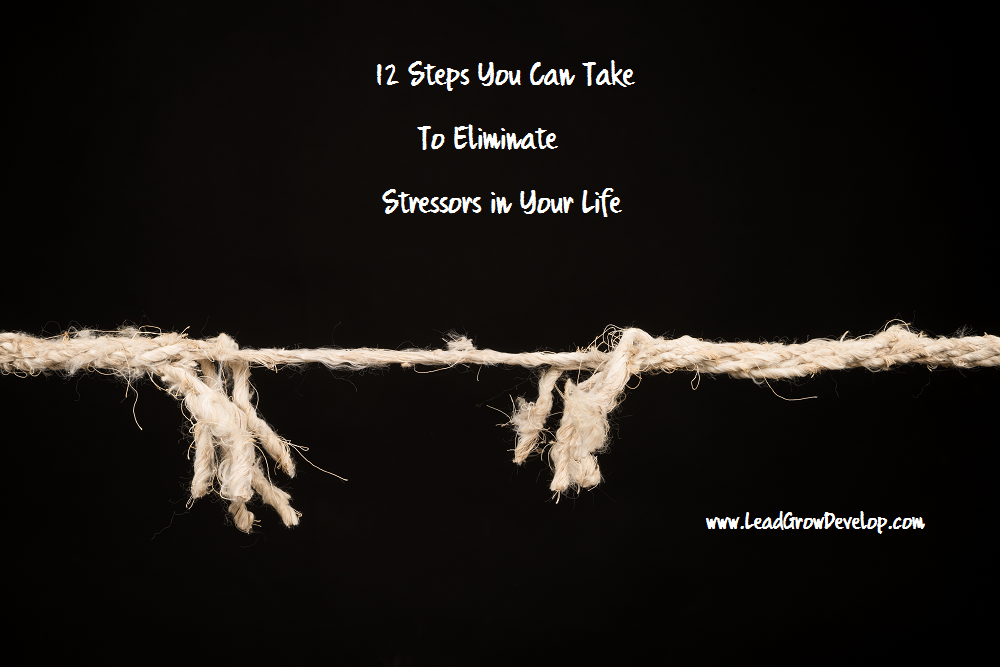Wake up, get the kids ready for school, rush to work, finish that project that is overdue and prepare for the meeting in the afternoon. Then go home, make sure the kids get their homework done, cook supper, clean up, take the kids to soccer and on and on. With so much going on in our lives, how can we do anything but be stressed? There are just too many stressors out there that we are bound to bump into several of them throughout the day.
As I mentioned in my last blog post, “What Stressors are You Creating?”, some stress is necessary and can actually be good. Think about the stress you feel the last day of work before you leave on vacation. How productive are you during that day? Don’t you miraculously find a way to get everything done? Most people claim to be the most productive when they have that looming deadline coming up.
This article is not about eliminating all stress from your life but just the harmful stress that is deterring you from being Happy, Productive and your “Best You”.
Here are 12 Steps You Can Take to Eliminate Stressors
Recognize Them
Take a moment and jot down what are your biggest stressors right now. Not the ones that are motivating you to perform but identify those that are affecting your health. How can you tell the difference? Good stress will inspire and propel you to complete or perform a particular task. Bad stress is more ongoing and can hinder you from accomplishing your goals.
Eliminate Unnecessary Commitments
Think about your obligations. Are there any that are not aligned with your goals or values? Can you try to delegate or eliminate some unnecessary commitments that are preventing you from performing tasks that are most important to you? If going back on some of your commitments is creating its own stress, then just commit to being intentional about what you take on in the future.
Procrastination
If you are going to procrastinate, then do so with purpose. Put off those things that are not important to Focus on what is. If you decide that something is of value, don’t wait to start. It will only add-on more to your to-do list later.
Task Management
Prioritize your tasks and what you spend your time on during the day. Before you even start the day, think about what your 2-3 most important tasks are for that day. Start with those tasks first, then celebrate.
Get Up Earlier
If you are not a morning person, you’d be surprised at how you can train your body to become one. Or, at least be an “earlier than usual” person. If you find yourself being late or just on time for everything, waking up 30 minutes earlier can make a huge difference on your stress levels. It does not feel good to have to rush all the time and it starts your day off on the wrong foot.
Tolerating
What are you tolerating? What would it look like if you no longer tolerated certain stressors? How much more energy would this allow you to have? If the answer comes to you easily, then you know that you have been allowing certain things to happen that you shouldn’t.
Energy Drains
Are there factors in your life that are draining you? Are there people in your surroundings that take…take…take but never give? What changes can you make to put a plug on that leak?
Your Network
The people you surround yourself with play a huge role in the stress you may feel. Who do you choose to spend your time with? Are they supportive of your goals? Do they challenge you and believe in you? Are there people who you should limit your association with or eliminate out of your life completely? Make it a habit to network with inspiring people who add to your energy when you are around them.
[tweetthis]“You are the average of the five people you spend the most time with.” Jim Rohn[/tweetthis]
Transitioning
Finding a way to transition between busy projects is important. Giving your mind the time it needs to relax after its been going on strong will give it the recharge it needs to tackle the next project. If you had a particularly hectic day at work, before you walk into your home at the end of the day, think about what you can do to transition. Take 5-10 minutes in your car to just breathe, relax or listen to music. Find a way to decompress before opening those doors. Don’t transfer the busyness of the day to your home.
Exercise and Nutrition
There are so many choices out there today that there really is no reason for not being able to find time to exercise. You don’t even have to go to the gym or spend hours working out. Available today are several 25-30 min workouts that can get your heart pumping. A healthy body helps contribute to a healthy mind.
Sleep
Getting enough sleep is one of the most important factors in maintaining a healthy stress level. If you wake up and you are still tired, relook at your sleep patterns. When you are fatigued, you will not perform at the same level as when you are rested. Think about how much clearer your thoughts are and how primed you are to take on new challenges after a rejuvenating vacation.
Gratitude
Sometimes gratitude can help put things in perspective. When we practice gratitude, we are allowing ourselves to celebrate the present. It is also a great way to combat some of the stress you may be feeling.
What are your biggest stressors right now? What can you do to try to eliminate or redirect that stress?

